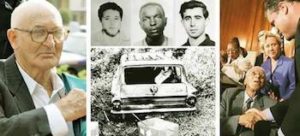
On this date in 2005, an 80-year-old former Ku Klux Klansman was convicted of manslaughter in Mississippi.
White-American Edgar Ray Killen was convicted of the murders of three Civil Rights workers exactly 41 years ago. A jury of nine Whites and three Blacks reached the verdict on their second day of deliberations, rejecting murder charges against Killen but also turning aside defense claims that he wasn't involved. An all-white jury in 1967, just three years after the murders, had found Killen innocent.
James Chaney, a Black Mississippian, and Andrew Goodman and Michael Schwerner, Jewish New Yorkers, were in Neshoba County to look into the burning of a Black church and to help register Black voters during what was called Freedom Summer. The three were stopped for speeding, jailed briefly, and then released, after which they were followed out of town by a gang of Klansmen and ambushed on June 21, 1964.
Killen, an ordained Baptist minister, a sawmill operator, and a Kleagle in the Ku Klux Klan, showed no emotion as the guilty verdict was read. He was comforted by his wife as he sat in his wheelchair, wearing an oxygen tube. Heavily armed police formed a barrier outside a side door to the courthouse, and jurors were loaded into two waiting vans and driven away.
Ben Chaney, James Chaney’s brother, thanked the prosecutors but said that for the community, "I really feel that there is more to be done." Schwerner's widow, Rita Schwerner Bender, praised the verdict, calling it "a day of great importance to all of us." But she also said, "Preacher Killen didn't act in a vacuum; the state of Mississippi was complicit in these crimes, and all the crimes that occurred, and that has to be opened up."
Killen had been tried in 1967 on federal charges of violating the victims' civil rights. But the all-white jury deadlocked, with one juror saying she could not convict a preacher. Seven others were convicted, but none served more than six years.
Prosecutors in the 2005 trial had asked the jury to send a message to the rest of the world that Mississippi had changed and was committed to bringing to justice those who were killed in the 1960s to preserve segregation. They said the evidence was clear that Killen organized the attack on the three victims. Killen's lawyers conceded he was in the Klan but said that did not make him guilty. They pointed out that prosecutors offered no witnesses or evidence that put Killen at the crime scene.
Killen did not take the stand but has long claimed that he was at a wake at a funeral home when the victims were killed. While Killen was indicted on murder charges, which could carry a life sentence, prosecutors asked the judge to allow the jury to consider the lesser charge of manslaughter, which has a maximum sentence of 20 years in prison.
Attorney General Jim Hood said that with a murder charge, prosecutors had to prove intent to kill. With a manslaughter charge, he said, prosecutors had to prove only that a victim died while another crime was being committed.
Killen was convicted and served three 20-year terms, one for each conviction of manslaughter in connection with the deaths of Chaney, Goodman, and Schwerner in 1964. Judge Gordon said in pronouncing the sentence, "I have taken into consideration that there are three lives in this case and that the three lives should be absolutely respected." Killen was the only person ever brought up on murder charges in the case by the state of Mississippi.